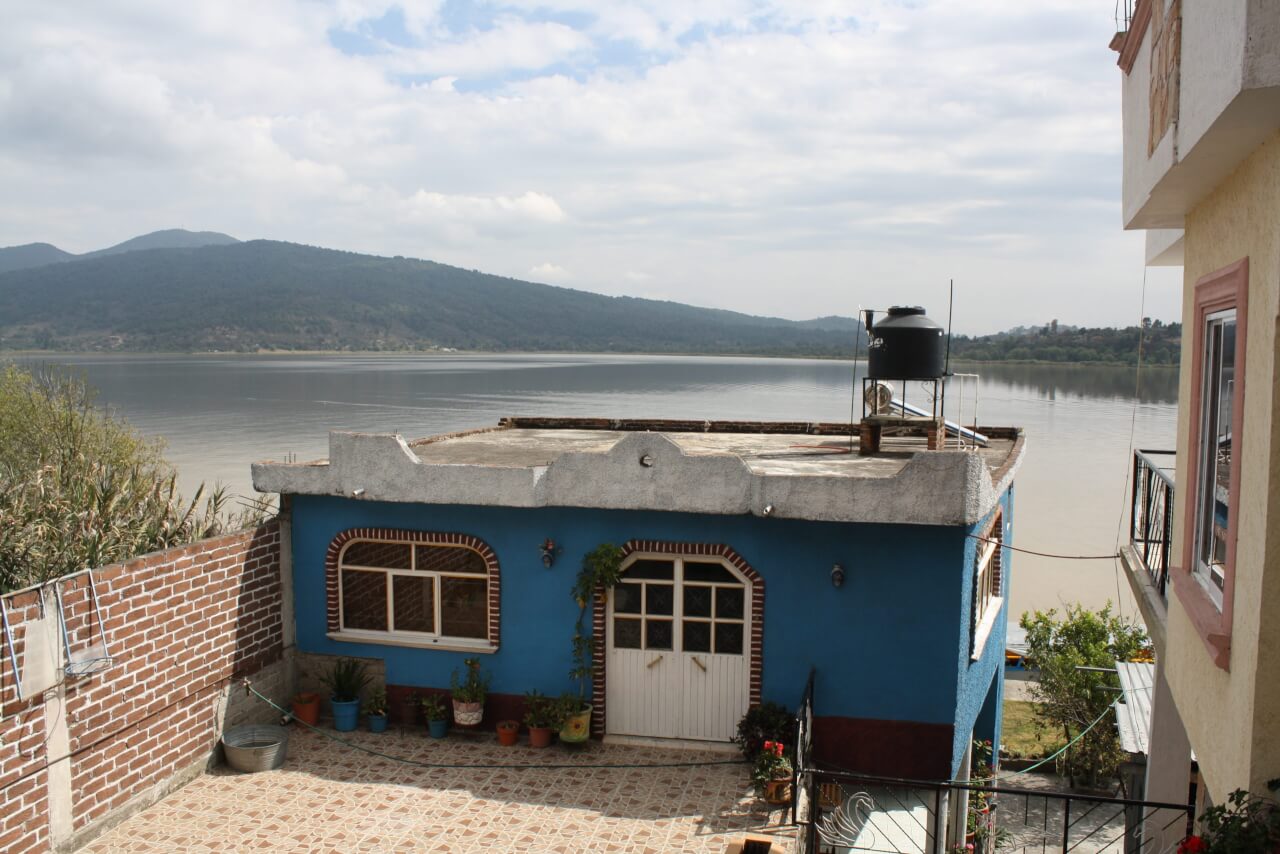For Mexican Farmworkers H2A Jobs Come with a Social Cost
A proposed bill could ease their plight.
For Mexican Farmworkers H2A Jobs Come with a Social Cost
A proposed bill could ease their plight.

An altar in a home on Isla Tecuena. Photography by Sierra Dickey
Gael gets a little nervous when asked if he could discuss his seven years as an H2A guest worker on a Tennessee tobacco farm. The 27-year-old sat on a wooden chair outside his home on Isla Tecuena. It was the morning after his cousin’s wedding celebration, and most of the small island’s population was asleep or cleaning up. A few were still drinking Centenario and Squirt in plastic cups. Flanked by his wife Lupe, his four-year-old son Miguel Angel, a friend named Osmar, and a speaker playing reggaeton hits of 2019, Gael was clearly enjoying vacation mode.
Like the majority of the young men in his community, Gael only spends a few winter months at home. As an H2A worker, he resides in the US for eight months a year to support himself and his relatives. He asked that Modern Farmer not disclose his last name for fear that speaking out would affect his employment. Isla Tecuena, where he was raised and now lives, is one of four islands in Lake Patzcuaro that are occupied by indigenous Purepecha people. The Mexican state of Michoacan, where the lake is located, has consistently been a top sending state for the US H2A program since at least 2012.
For many young men employed by the H2A program, the coming and going routine is a challenge. The incomes they make provide for their needs, but their absences create other problems. Gael and his wife, Lupe, agree that their son relates to them each differently. “He doesn’t obey her, and he obeys me, but only because he’s afraid of me,” says Gael.
Other farmworkers from the island say that single men tended to stay in the US longer. Men with families and commitments said that if they were single they would stay as long as they possibly could. Many had been away working during the births of their children. One began to hear his friends at home accuse his partner of cheating on him and spending the money he sent her as soon as she received it. This proved difficult to clear up from a distance and the worker now sends his money home to his mother instead.

Gael’s lake-dwelling community in particular has a long history of participation in H2A. When asked why so many Michoacanos like him use H2A, Gael said “it’s always been easy.” H2A recruiting companies such as LaborMex LLC operate in the nearby state of Jalisco, and there’s a strip of offices advertising “visa assistance” and “secure work in the USA” outside the historical town center of Patzcuaro, the hub for the region.
Being accustomed to the rhythms of H2A employment may also account for high rates of participation. Gael’s father, uncles, and male cousins all had H2A experience before he started. When he was 18, he realized “I didn’t want to study,” so H2A work was the other option. Now, Gael says, “I wish I could change and study,” in part to get higher-paid jobs and to spend more time with his growing son. On return trips home, he had begun to see how hard it was to “form a relationship in four months.”
In today’s inflamed immigration debate, the words “legal” and “illegal” are used indiscriminately to describe undocumented people and their work. In this light, H2A visas remain a reliable way in which large numbers of immigrants can work “legally” in the United States. And yet, participation requires significant sacrifices at home.
READ MORE
The H-2A Temporary Agricultural Worker Visa Process Explained
These trade-offs that workers like Gael make might be eased by proposed changes to the H2A program under the Farm Workforce Modernization Act, which passed Congress in December 2019. The legislation, which Modern Farmer previously covered here, seeks to extend H2A laborers’ right to work and would authorize undocumented farmworkers who have been engaged in agriculture for at least two years prior. H2A workers like Gael are currently limited to three years of consecutive work and cannot bring family to the US. The new bill, if passed, would expand this timeline to five years, allow worker families with small children and open a path to obtaining legal status in the form of a green card.
Follow us
This work is licensed under a Creative Commons Attribution-NoDerivatives 4.0 International License.
Want to republish a Modern Farmer story?
We are happy for Modern Farmer stories to be shared, and encourage you to republish our articles for your audience. When doing so, we ask that you follow these guidelines:
Please credit us and our writers
For the author byline, please use “Author Name, Modern Farmer.” At the top of our stories, if on the web, please include this text and link: “This story was originally published by Modern Farmer.”
Please make sure to include a link back to either our home page or the article URL.
At the bottom of the story, please include the following text:
“Modern Farmer is a nonprofit initiative dedicated to raising awareness and catalyzing action at the intersection of food, agriculture, and society. Read more at <link>Modern Farmer</link>.”
Use our widget
We’d like to be able to track our stories, so we ask that if you republish our content, you do so using our widget (located on the left hand side of the article). The HTML code has a built-in tracker that tells us the data and domain where the story was published, as well as view counts.
Check the image requirements
It’s your responsibility to confirm you're licensed to republish images in our articles. Some images, such as those from commercial providers, don't allow their images to be republished without permission or payment. Copyright terms are generally listed in the image caption and attribution. You are welcome to omit our images or substitute with your own. Charts and interactive graphics follow the same rules.
Don’t change too much. Or, ask us first.
Articles must be republished in their entirety. It’s okay to change references to time (“today” to “yesterday”) or location (“Iowa City, IA” to “here”). But please keep everything else the same.
If you feel strongly that a more material edit needs to be made, get in touch with us at [email protected]. We’re happy to discuss it with the original author, but we must have prior approval for changes before publication.
Special cases
Extracts. You may run the first few lines or paragraphs of the article and then say: “Read the full article at Modern Farmer” with a link back to the original article.
Quotes. You may quote authors provided you include a link back to the article URL.
Translations. These require writer approval. To inquire about translation of a Modern Farmer article, contact us at [email protected]
Signed consent / copyright release forms. These are not required, provided you are following these guidelines.
Print. Articles can be republished in print under these same rules, with the exception that you do not need to include the links.
Tag us
When sharing the story on social media, please tag us using the following: - Twitter (@ModFarm) - Facebook (@ModernFarmerMedia) - Instagram (@modfarm)
Use our content respectfully
Modern Farmer is a nonprofit and as such we share our content for free and in good faith in order to reach new audiences. Respectfully,
No selling ads against our stories. It’s okay to put our stories on pages with ads.
Don’t republish our material wholesale, or automatically; you need to select stories to be republished individually.
You have no rights to sell, license, syndicate, or otherwise represent yourself as the authorized owner of our material to any third parties. This means that you cannot actively publish or submit our work for syndication to third party platforms or apps like Apple News or Google News. We understand that publishers cannot fully control when certain third parties automatically summarize or crawl content from publishers’ own sites.
Keep in touch
We want to hear from you if you love Modern Farmer content, have a collaboration idea, or anything else to share. As a nonprofit outlet, we work in service of our community and are always open to comments, feedback, and ideas. Contact us at [email protected].by Sierra Dickey, Modern Farmer
February 17, 2020
Modern Farmer Weekly
Solutions Hub
Innovations, ideas and inspiration. Actionable solutions for a resilient food system.
ExploreExplore other topics
Share With Us
We want to hear from Modern Farmer readers who have thoughtful commentary, actionable solutions, or helpful ideas to share.
SubmitNecessary cookies are absolutely essential for the website to function properly. This category only includes cookies that ensures basic functionalities and security features of the website. These cookies do not store any personal information.
Any cookies that may not be particularly necessary for the website to function and are used specifically to collect user personal data via analytics, ads, other embedded contents are termed as non-necessary cookies.
ROBOTS ARE THE FUTURE OF FARMING!
WHY ARE FARMERS BRINGING IN LOW WAGE WORKERS, DESTROYING COMMUNITIES IN MEXICO AND USA?
WAKE UP FARMERS, OPEN YOUR MIND TO SOLVING WHAT IS A REAL PROBLEM IN AMERICA
BAN THE PRACTICE OF AMERICAN CITIZENS SUBSIDING FARMS WITH GOV BENEFITS FOR THEIR EMPLOYEES
LETTUCE IS NOT CHEAP WHEN ALL COST INCLUDED
Just another step in the process of open doors to allow more immigration. Fact is we have too many undocumented living off the fat of the land. Im not feeling sorry for people who make the choice to work as they do. USA is not the worlds savior. Stop Enabling residents of foreign countries. Bleeding hearts always pushing for another loop hole.
If you feed them they will come!